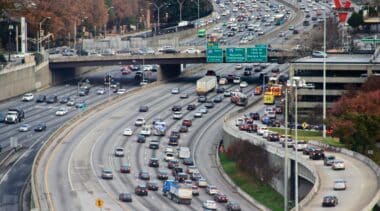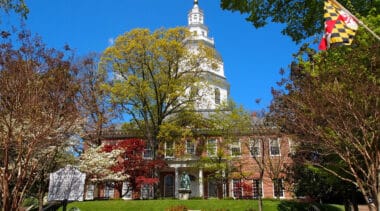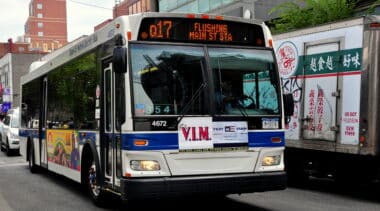-
Missouri’s 2025 K-12 open enrollment proposals
Missouri is considering three open enrollment legislative proposals: Senate Bill 215, House Bill 711, and Senate Bill 572.
-
Transportation and climate change: Public transit
This report focuses primarily on operating energy intensiveness and transportation energy impacts as affected by public transportation’s influence on land use.
-
Interstates first: Why the transition to road user charges should begin with limited access highways
To begin the transition from gas taxes to per-mile charging, the U.S. needs a plan to address drivers' privacy, double taxation concerns, and the cost of collection.
-
Missouri bills would protect free expression and artistic freedom
Senate Bill 661 and House Bill 1389 would create uniform standards for the admission of song lyrics and other forms of artistic expression into evidence.
-
Transportation and climate change: Travel trends and GHG emissions
As the single largest domestic GHG emissions-producing sector, transportation is inevitably a focus of climate change mitigation initiatives.
-
Montana’s proposed regulatory framework for autonomous vehicles needs reform
Montana’s Senate Bill 67 attempts to provide a regulatory framework for autonomous vehicles, but the proposal conflicts with best practices learned in other states.
-
Optimal framework for the state regulation of hemp cannabinoids
The hemp cannabinoid market has grown into a $3 billion interstate industry.
-
New Mexico Senate Bill 219 would regulate medical psilocybin access
The Medical Psilocybin Act would create a regulated system to allow patients with qualifying conditions to access and use psilocybin.
-
28th Annual Highway Report: Executive summary of findings and state rankings
The Annual Highway Report examines every state's road pavement and bridge conditions, traffic fatalities, congestion delays, spending per mile, administrative costs, and more.
-
Transportation revenue options in Maryland
Maryland needs to replace the fuel tax with a new more sustainable revenue source.
-
The Florida Retirement System’s proposed cost-of-living adjustment comes with major costs and risks
The cost-of-living adjustment proposed in Florida House Bill 945 could cost taxpayers over $47 billion over 30 years.
-
Addressing the transit productivity crisis
Public transit ridership is unlikely to recover to pre-pandemic levels within the next decade.
-
House Bill 78 exposes Alaska to significant additional costs
This bill could realistically add $11.4 billion in additional costs to future state budgets and reintroduce Alaska to significant pension risk.
-
Arizona Senate Bill 1365 threatens higher taxpayer costs and pension risks
Arizona Public Safety Personnel Retirement System Tier 3 reform is working. Senate Bill 1365 would fundamentally alter the current system.
-
Legalizing psilocybin access in Arizona would benefit mental health
Arizona Senate Bill 1555 would create a regulatory framework for limited, legal access to therapeutic psilocybin services.
-
Delaware Senate Bill 46 would ban autonomous vehicles
Automated vehicle technology under development could greatly improve road safety and efficiency.

















